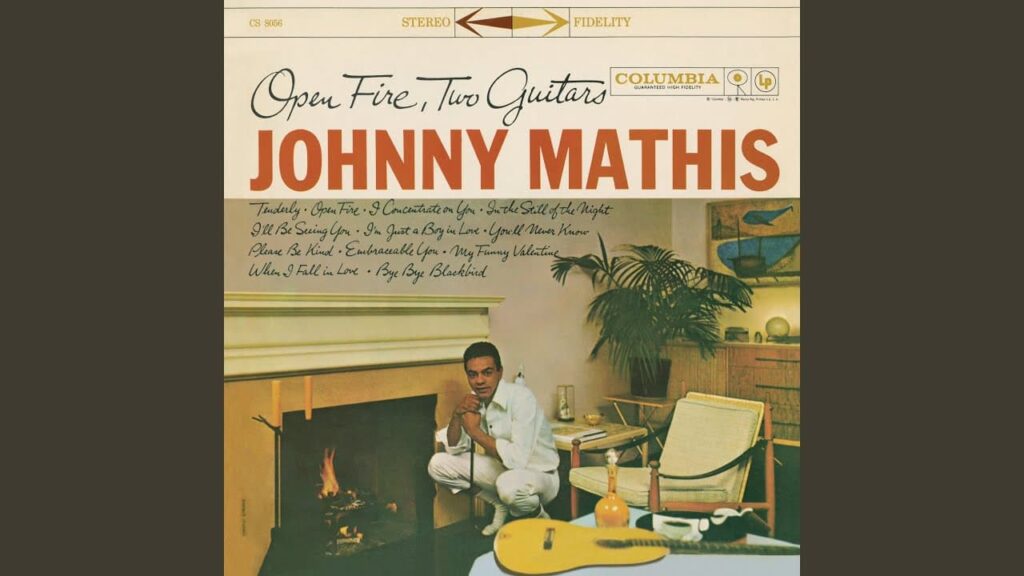
A timeless vow of love: “When I Fall in Love” by Johnny Mathis
In the mellow glow of memory and the quiet hum of a record turning, the voice of Johnny Mathis on his tender rendition of “When I Fall in Love” becomes more than a song—it becomes a gentle promise echoing through a lifetime. Released on his 1959 album Open Fire, Two Guitars, the track finds Mathis at a moment of elegant transition: stripped of orchestral grandeur and embraced by acoustic intimacy.
Though it was not issued as a single by Mathis himself, the song had already carved its place in the popular consciousness via earlier versions—namely by Nat King Cole, whose 1957 release reached No. 2 in the UK Singles Chart. While Mathis’s own chart‑peak for this particular version remains un‑specified, its approval as part of an album that climbed to No. 4 on the US Billboard Best Selling LPs chart is clearly documented.
What is the story behind this performance, and why does it continue to glimmer in the hearts of those who remember turning the dial on their radios, or slipping a vinyl into the player while the evening light faded? The song itself—written by Victor Young (music) and Edward Heyman (lyrics)—was introduced in the film One Minute to Zero, and its earliest hit versions date back to the mid‑1950s.
When Mathis recorded the track in October 1958 (sessions for the album dated 2 and 3 October) and its subsequent release in January 1959, it represented a subtle shift in his approach. The album’s title Open Fire, Two Guitars signals the musical intimacy—a singer, two guitars, sparse accompaniment—allowing his voice to linger in the air, reflective and warm.
Within this context, Mathis’s interpretation of “When I Fall in Love” becomes a moment of stillness in an era of early rock and roll’s brash entrance. His voice doesn’t demand — it invites. It doesn’t declare — it whispers. And for an audience who has known love and perhaps longed for it, or remembered it once and lets it drift now like autumn leaves, the song becomes a gentle mirror: to feel, to recall, to hope again.
Musically and emotionally, the song’s meaning is straightforward yet profound: “When I fall in love—it will be forever; or I’ll never fall in love.” That opening line wraps a world of yearning, caution, devotion. It’s the vow of someone who knows that love cannot be casual, cannot be temporary—it must be total, eternal—or not at all. In Mathis’s hands, the phrase takes on an almost confessional tone: “I am here, and if I give myself, I give everything.”
But beyond the lyric, there is the life behind it. Mathis by 1959 had already earned a reputation as a romantic balladeer, whose smooth, warm timbre invited listeners into a soft sanctuary of feelings. To place this song in his repertoire was to reaffirm what he did best: create a space in which time slows, and hearts remember. The album itself would stay on the charts for many weeks, becoming part of the soundtrack of late‑1950s evenings, of dancing shadows in lounges, of quiet drives and maybe even new love held closely in a soft light.
For older listeners, there is a layered nostalgia here: the memory of pressing “play”, the gentle crackle of the vinyl, the steady hum of a heater in a living room, lights dimmed, perhaps a partner by your side or maybe just your own reflection in the window. The song invites one to look back—not with sorrow, but with a kind of tender clarity. The longing is real, the possibility of love glimmers again, and the voice of Mathis becomes a friend whispering, “It’s still possible.”
In evaluations of the song’s significance, one might say that while Mathis’s version did not become a major hit single, its inclusion on an album that sold well and his ability to render songs with emotional fidelity give it lasting resonance. It combines the standard‑song tradition (the kind of repertoire once sung by crooners for grown‑up listeners) with a sincerity that transcends decades. It wasn’t about flashy theatrics—it was about connection, subtlety, and time.
In summing up the enduring value of “When I Fall in Love” as sung by Johnny Mathis: it is at once an offering and a remembrance. It says: I promise, I wait, I listen. It also says: remember when we felt that way. And to listen decades later is to re‑open the door to that feeling—soft, unhurried, thoughtful. For those who carry memories of early‑evening records, of whispered dreams, this song remains a warm hearth in the cool evenings of age and recollection.
Hold it close. Let the chords settle around you like a well‑worn shawl. And if you listen carefully, you might hear the faint echo of an unspoken vow: “If I fall in love, it will be forever.”